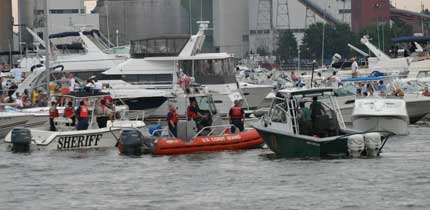|
4th
Fireworks Advisory
by Tom Rau
 |
| Great Lakes harbor mouths, river
channels, bays and connecting lakes draw
hundreds of boaters to fireworks events.
Pictured is the Grand Haven, Michigan River
Channel alive with boaters awaiting the
annual Coast Guard Festival fireworks
extravaganza. Photo, Marge Beaver/Tom Rau |
Across the
Great Lakes local waterfront communities will be
hosting firework events. In order to maintain a high
level of safety that these events demand, Coast
Guard crews along with local marine law enforcement
agencies will be out in force. Boaters can play a
large part in assisting law enforcement officials
during waterfront events by adhering to the
following safety guide lines.
Boaters
should keep within safety buoys and avoid transiting
across security zones that are in place to create
separation between the fireworks platform and
spectators.
Fireworks
zones require up to a 1000-foot distance between
spectator boats and the fireworks platform.
Authorities will delay the fireworks until all
boaters are in compliance. In those cases where a
river channel is temporarily shut down due to
fireworks, such as when the fireworks platform is
located near a harbor mouth, boaters will be
notified in advance on marine radio (VHF-FM Channel
22) and Local Notice to Mariners of the channel
closure and times. For those occasional late-comers,
channel-closing times will be strictly enforced so
the show may begin on time.
Boaters
attending events after dusk are required to display
proper running lights, and if anchored, the proper
anchor light. Marine officials will send boaters
back to their moorings if they fail to display
proper navigation lights. Boaters should remember to
fully charge batteries; a low battery may prevent
engine start, which could find the boater adrift in
the dark amongst heavy boating traffic.
Over the
years, I’ve often seen boaters transiting a
congested channel at night with their stern light
covered with gear. This is a good way to get run
down from behind. Keep that stern light clear and
keep extra bulbs aboard.
Near channel
mouths and in dark river channels, post a forward
lookout. You just might come upon a boater with a
dead battery. Keep a flash light nearby, which can
also be handy for disabled and adrift boaters to
flash their presence.
Always
operate at a safe speed. After larger events, Great
Lakes harbor mouths, river channels, and nearby
lakes can swarm with boaters. I’ve patrolled many of
these waters and know that dark waters can make
navigation treacherous. Operate at a safe speed, and
to repeat: post a forward lookout.
Of utmost
importance: Enjoy the event and be assured the
safest way home is the Boat Smart way.
Tom Rau is a long-time Coast Guard rescue
responder and syndicated boating safety columnist.
Look for his book, Boat Smart Chronicles,
a shocking expose on recreational boating — reads
like a great ship’s log spanning over two decades.
It’s available to order at: www.boatsmart.net,
www.seaworthy.com, www.amazon.com, or
through local bookstores.
TOP
|